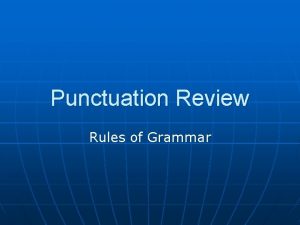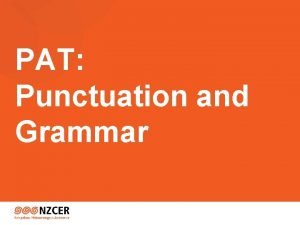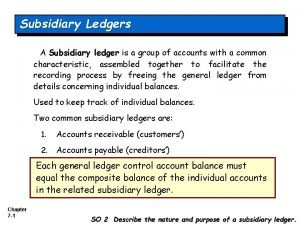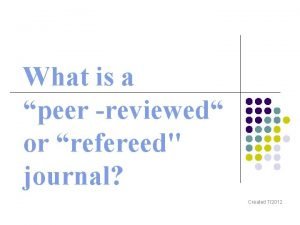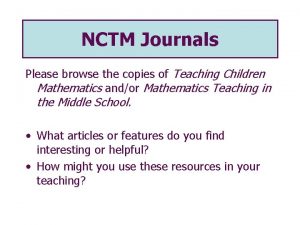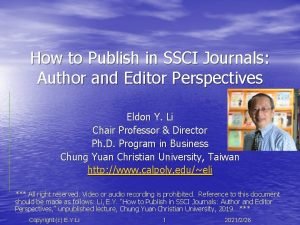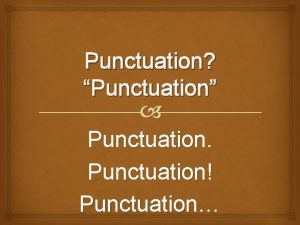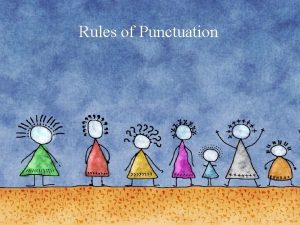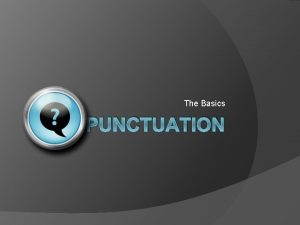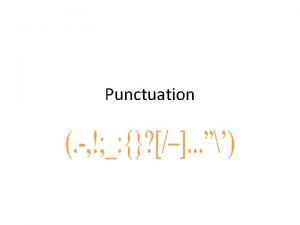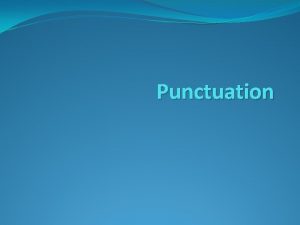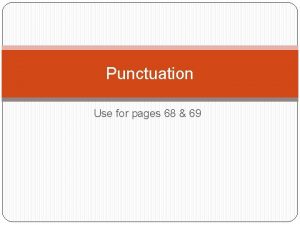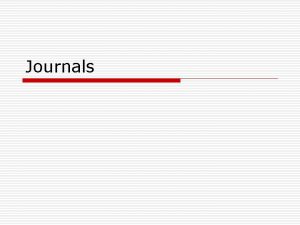AP JOURNALS Grammar and Punctuation GRAMMAR JOURNAL 1











- Slides: 11

AP JOURNALS Grammar and Punctuation

GRAMMAR JOURNAL # 1 Subjects and Predicates Subjects are the main noun in a clause: EXAMPLE: It is important to feed the ducks when George tells you. Predicates are the main verb in a clause (what the subject is doing): EXAMPLE: It is important to feed the ducks when George tells you. Subject + Predicate = Clause PROMPT: Should college athletes be paid? Underline every subject. Box every predicate.

GRAMMAR JOURNAL #2: Clauses and Compound Sentences FOR, AND, NOR, BUT, OR, YET, SO are coordinating conjunctions that create compound sentences. When they appear between subject verb pairs (clauses), a comma is needed. EXAMPLE: “Ed was weary, for the journey had been long and tiring. ” EXAMPLE: “There are reasons to worry, yet Sandy and I choose not to. ” PROMPT: Should Green Technology companies get tax breaks? Use at least three compound sentences.

GRAMMAR JOURNAL #3: Complex Sentences, Conjunction in middle Words like BECAUSE, WHEN, IF, AS (and many more) are subordinating conjunctions that create complex sentences. No comma is necessary when they appear between clauses. EXAMPLE: “They left early since they had another commitment. ” EXAMPLE: “The police knew what the suspect looked like. ” PROMPT: Should voting be legally required? Use at least three complex sentences with conjunctions in the middle.

GRAMMAR JOURNAL #4: Complex Sentences, Conjunction Begins Sentence When complex sentences begin with a subordinating conjunction, a comma is required. EXAMPLE: “Even though rescue seemed unlikely, they held out hope. ” EXAMPLE: “If you need paper towels, they are n the closet. ” PROMPT: Should cigarette companies be allowed to advertise? Use at least three complex sentences that begin with the conjunction.

GRAMMAR JOURNAL #5: Compound-Complex Sentences with three clauses are called compound-complex sentences. To punctuate these, you need to pay careful attention to conjunctions. EXAMPLE: When the bus arrived, Gary got aboard, but Stan remained. EXAMPLE: Gary got aboard when the bus arrived, but Stan remained EXAMPLE: Gary got aboard, but Stan remained when the bus arrived. PROMPT: Are online-only charter schools a positive thing? Use at least three complex-compound sentences in your response.

GRAMMAR JOURNAL #6: Modifying Phrases Modifiers that begin a sentence generally require a comma: EXAMPLE: “Waving his arms madly, Gary seemed upset. ” EXAMPLE: “Between the house and the river, a pole stood firm. ” Dangling and Misplaced Modifiers occur when modifiers are not next to the things they describe: BAD: “Driving around the corner, a bear leaped out of nowhere!” GOOD: “Driving around the corner, I saw a bear leap out of nowhere!” BAD: “Everyone admired the blanket for the new baby, which was blue. ” GOOD: “Everyone admired the baby’s new blanket, which was blue. ” PROMPT: Should the government continue to fund space exploration? Begin at least three sentences with modifying phrases.

GRAMMAR JOURNAL #7: Modifying Phrases Continued Restrictive phrases require commas. Non-restrictive phrases do not. Example: ”Ostriches, which lay eggs, do not nurse their young. ” Example: “Animals which lay eggs do not nurse their young. ” PROMPT: Should solar panels be required on all new homes? Write some sentences with restrictive and non-restrictive phrases.

GRAMMAR JOURNAL #8: Subject and Object The following pronouns are ALWAYS subjects: I, He, She, They, We, Who The following pronouns are ALWAYS objects: Me, Him, Her, Them, Us, Whom EXAMPLE: “To whom should I deliver this? ” EXAMPLE: “He and Fred know about Skippy and her. ” EXAMPLE: “Do you have more water than we [do]? ” EXAMPLE: “It is I. ” (noun complement) PROMPT: Should handguns be outlawed? Use the word “whom” and “who. ”

GRAMMAR JOURNAL #9: Agreement means words match in terms of number or tense. EXAMPLE: “The priests and the cardinal enjoy sandwiches. ” (not “enjoys”) EXAMPLE: “An apple or a carrot is a healthy snack. ” (“or” means singular verb) EXAMPLE: “Each item in the boxes needs to be washed. ” (“Each” and “Every” mean singular verb) EXAMPLE: “Everyone with a job knows that he or she is lucky. ” (though some find this structure offensive and prefer “their” be recognized as singular) PROMPT: Should people be allowed to build new homes in areas prone to wildfires? Use sentences that begin with words like EACH and EVERY. Use a “His or Her” OR “THEIR” in your sentences.

GRAMMAR JOURNAL #10: Hyphens Use hyphens with numbers and two-word adjectives: EXAMPLE: “The overly-long paper of seventy-five pages” Use hyphens when you create new words with prefixes: EXAMPLE: “We de-sprinkled one cupcake in the mid-1980 s” Use hyphens with coined phrases: EXAMPLE: “It’s a who-cares-let’s-just-get-it-done kind of day. ” PROMPT: Should Puerto Rico and/or Washington D. C. be granted statehood?
